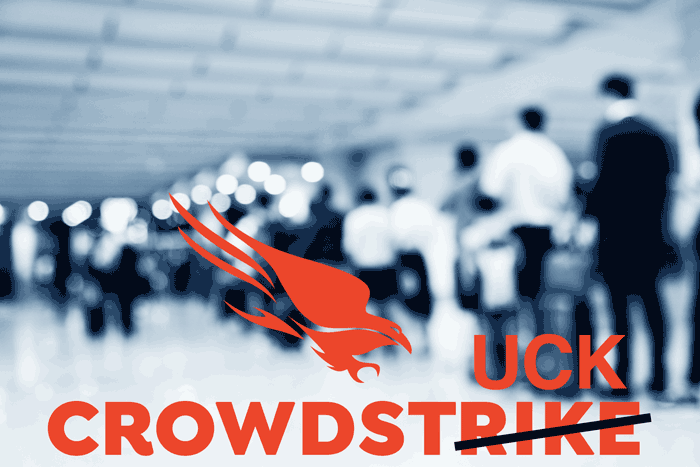Your cart is currently empty!
CrowdStuck thanks to CrowdStrike
In an era where technology permeates every aspect of our lives, the travel industry stands as one of the most heavily reliant sectors. From booking tickets to navigating airports, technology has streamlined travel, making it more efficient and convenient. However, global outages due to a Microsoft system failure sparked by a CrowdStrike software update bug left millions of travelers stranded highlighting a significant downside to our overreliance upon technology.
The Fragility of Technological Systems
Modern travel depends on a web of interconnected technological systems. Airlines, airports, and travel agencies all use complex software to manage reservations, check-ins, security, and flight operations. While these systems are generally robust, they are not infallible. When they fail, the consequences can be catastrophic.
On July 17, 2023, a coordinated ransomware attack hit United Airlines, causing a system-wide failure in their reservation and check-in systems. This led to the grounding of over 2,000 flights and affected more than 1.5 million passengers over three days. Travelers found themselves stranded, unable to rebook or get timely updates. Airports became scenes of chaos, with frustrated passengers forming long lines at understaffed counters, trying to find alternative travel arrangements. At the time, United issued statements denying an attack trying to downplay the fact that their security systems were antiquated and required updating. I told Benzinga that a series of “glitches” were too coincidental to not be coordinated attacks, especially considering the cyber vulnerabilities that most companies continue to overlook.
The Human Element
In the long term, over reliance on technology always leads to a reduction in the human workforce in any industry and the travel industry is no different. Automated kiosks and online check-ins have replaced many front-line staff. While this shift has increased efficiency, it has also left the industry vulnerable when technology fails.
During the 2023 outage, the shortage of human staff exacerbated the problem and the major outages affecting Delta this week appear to be no different. Many passengers reported that there were not enough ground personnel to handle the crisis, leading to a breakdown in communication and customer service. This incident underscores the importance of maintaining a balance between technology and human resources. Human employees can provide flexibility and problem-solving skills that automated systems cannot, especially during emergencies.
Here come the Hackers
This week, US Secretary of Transportation, Pete Buttigieg, weighed in on the massive outages. While many airlines were affected, it seemed that Delta Airlines were not only affected but entirely too slow in recuperating and continue to face massive delays even as I write.
Whether there ever is true accountability for the likes of Delta or CrowdStrike, we can be certain of one thing, cyber criminals will take advantage of the uninformed customers. Angry and frustrated customers will begin receiving phishing emails and texts claiming to be from CrowdStrike, Delta or possibly some other airlines. When you have millions of angry travelers receiving fake apology emails and texts offering travel vouchers or some kind of customer credit, you are bound to get many folks clicking on those messages. Just because the CrowdStrike outage wasn’t the result of a hack, doesn’t mean that hackers won’t seize the opportunity to exploit the victims even more. I touch on this in my interview with NTD News on the many lessons and takeaways from this outage.
The Domino Effect
Technology’s interconnectedness means that a problem in one area can quickly cascade, affecting multiple systems. The CrowdStrike incident showed how a single point of failure in a routine software update could cripple an entire global network. Flights were grounded not only for the affected airlines but also for those sharing codes and using the same airport facilities.
This domino effect highlights the need for robust contingency planning. Travel companies should develop comprehensive backup strategies to ensure continuity of operations during technological failures. This could include maintaining offline systems that can be activated during emergencies and training staff to handle manual processes when necessary. It would seem that most airlines had some redundancies in place but not Delta.
Lessons for the Future
The CrowdStrike travel disruption serves as a wake-up call for the industry and travelers alike. It underscores the need for a balanced approach to technology, where innovation is tempered with resilience and security. Travel companies must invest in robust systems, cybersecurity, and human resources to ensure they can withstand and quickly recover from technological failures.
For travelers, it is essential to be prepared for unexpected disruptions. This includes keeping backup copies of important documents, maintaining flexible travel plans, and staying informed about potential risks. I always print out hardcopies of my itineraries when possible before traveling. By taking proactive measures, travelers can reduce their vulnerability to the pitfalls of overreliance on technology.

Scott Schober
CEO | Author | Speaker at Berkeley Varitronics Systems
Scott Schober presents at cybersecurity and wireless security conferences for banking, insurance, transportation, construction, telecommunications and law enforcement industries. He has overseen the development of dozens of wireless test, security, safety and cybersecurity products used to enforce a “no cell phone policy” in correctional, law enforcement, and secured government facilities. Scott regularly appears on network news programs including Fox, Bloomberg, Good Morning America, CNN, MSNBC, NPR and many more. He is the author of 'Senior Cyber', 'Cybersecurity is Everybody's Business' and 'Hacked Again', the “original hacker’s dictionary for small business owners” - Forbes Magazine.
Our Newsletter
Lorem ipsum dolor sit amet, consectetur adipiscing elit. Aliquam mattis ligula vitae leo scelerisque, sit amet feugiat ex venenatis.
"*" indicates required fields
Latest Posts
Our Best Sellers
How can we help?
Lorem ipsum dolor sit amet, consectetur adipiscing elit. Nunc dictum aliquet justo sit amet consectetur. In tempor lobortis ante vitae ornare. Praesent feugiat magna at tempor consequat. Aenean in iaculis libero, aliquam imperdiet mi.










Leave a Reply